Gilad Cohen, the Toronto-based founder of JAYU, knows the power of art personally to influence lives for the better. After suffering his bouts with depression, his discovery of photography through the Instagram feed of another local artist informed him of the ability of the arts to provide solace and direction for youth.
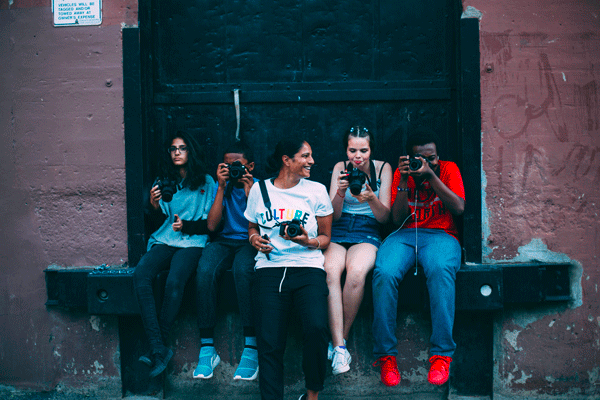
His background in the United Nations Sustainable Development Goal for Peace, Justice and Strong Institutions (Goal 16) through his advocacy for North Korean human rights was the impetus for JAYU’s initial genesis as a grassroots Human Rights Film Festival, which now falls under the umbrella of JAYU and has grown to a respected annual event.
This year’s fest, HRFF+, will also feature spoken word, comedy and a youth-led arts exhibition courtesy of the iAM programme, an 8-week year-round initiative offering youth from underserved communities arts and social justice training from the city’s most talented artists. I had the opportunity to sit on a zoom call with Cohen to discuss JAYU, the Human Rights Film Festival, and the actual value of art in a society that determines value in the material at the expense of Good Health & Well-being (Goal 3).
Can you tell me a little about JAYU?
JAYU is a Toronto-based charity that is committed to sharing human rights stories through the arts. We have a bunch of year-round programming where we build spaces for people to engage with arts that address inequity and injustice like our Human Rights Film Festival, podcast and youth programming. We mentor equity-deserving youth through the arts (iAM) and train them on how to share their own human rights stories in different art forms.
There’s a video on your website where you talk about this whole thing starting as a result of you going through your own rough period. Can you talk about that?
I came across a web article that featured a local artist Adeyemi Adegbesan, who now goes by the moniker Yung Yemi (@yung.yemi). It was just really beautiful photography of Toronto and I was blown away by the work. At the end of the article, it was mentioned that all of the photos were taken by iPhone which, to me, was a very accessible form of equipment. I didn’t have to go out and buy a fancy DSLR camera. So I started walking around the city trying to emulate this guy, and what I found was my depression and anxiety started to wither away as I became better at photography. What I started to realize was art was my medicine. Rather than investing my energy into destructive behaviour or self-medicating, I was investing my energy into expressing myself creatively.
Art was able to do what words couldn’t — express the inner parts of myself that may be hurt through a different means.
As a young person growing up I didn’t have any mentors in my life that taught me that the arts were an avenue that I could explore as a career, express myself or build community. That came to me later in life. The whole reason the iAM program exists is so that young people can grow up with mentorship that teaches them that there’s so much value in the arts — that the arts are a way to inspire, build community, talk about inequity, and to imagine the sort of world that all of us deserve to be living in, not to mention you can build a life for yourself in the arts as a career.
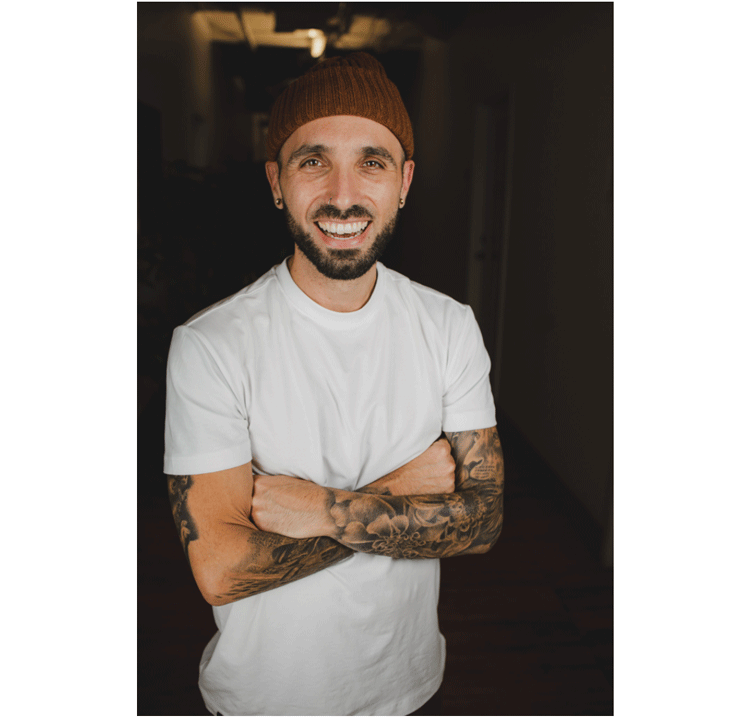
You said something that was really interesting — the idea that you didn’t know you could find this kind of life inside of the arts because nobody told you it was possible. Do you think our society views art as something frivolous or of no value? Why do you think that is, because it’s obviously impacted your life and the lives of the youth you mentor?
I think it’s because many of us don’t view art as an essential service like law or medicine. When we think about the pandemic and how it affected our mental health, especially within equity-deserving communities, a lot of people lean on the arts to help them get through the instability they find themselves in. It comes from people seeing it as a hobby or nice to have but when you look at something as a practice that can save a life, get you out of a bad place, and redefine the way you see the world and your place in it, that sounds like an essential service to me.
We need to reframe the way we look at the arts. One of the things I’m really interested in at JAYU is that we have full-time staff on a four-day workweek being paid for five days, and starting next year, the lowest-paid person at our organization will be paid a living wage instead of a minimum wage. We calculate a living wage as what you need to survive in the city because we also need to break the stereotype in the arts that we all need to be hungry and burnt out from doing good work for very little money. As an arts sector, we sort of do it to ourselves as well by underpaying and overworking. It’s become an expectation, and at JAYU, we want to break that cycle. We want to show people that you can earn a living wage or more in the arts.
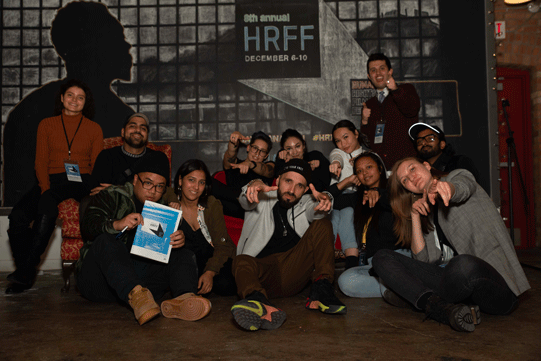
Take me from the Human Rights Festival to JAYU.
JAYU is the charity that grew out of the Human Rights Film Festival. Now, the festival is under the JAYU umbrella. Before I was involved in the arts, I was in international development, resettling North Korean refugees in South Korea and Toronto. I took a day trip to North Korea in 2008, and it was a very fabricated, staged experience. When I got back to South Korea, I did some research and learned it was a country where millions of people had starved to death, that there were concentration camps housing hundreds of thousands of people, that they had no access to the internet and couldn’t leave the country. So as a Jewish person who grew up around the stories of holocaust survivors and lost family to the holocaust, the idea that there were still concentration camps operating out there stuck to me. We as Jewish people say ‘never again,’ but here it was happening to other people. I dedicated myself to helping North Korean refugees and human rights awareness work.
Still, I had a hard time convincing my family to be as passionate about this issue as I was. I gave them books, articles and research papers, and nothing got through to them. Then one day at my mom’s house, I put on a documentary about North Korea and my mom broke into tears. That’s when I realized film and the arts could do something I couldn’t do. It was able to build this human connection between her and the North Korean people. So I started thinking about what could happen if I could fill a room with people and replicate that experience.
That’s how the Human Rights Film Festival began. We did that for several years and eventually began integrating youth programming and our podcast into the structure. When it became time to name our charity something, we called it JAYU, which means ‘freedom’ in Korean. Although we don’t focus strictly on North Korean rights, it pays respect to the organization’s roots.
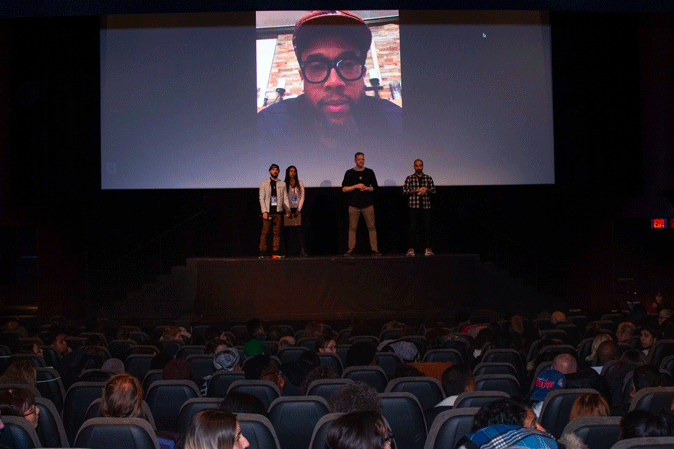
What are the mechanics of launching a film festival?
It started super grassroots and super budget. In the first year, I and some other volunteers launched a crowdfunding campaign where we raised $3,000 and rented a cinema out at UofT (University of Toronto), bought a Bristol board and built a sort of box office. Someone from TIFF (Toronto International Film Festival) attended our festival and invited us to do it at the TIFF Bell Lightbox the following year. It’s grown year over year to this significant ten-day event.
Each year we get over three hundred films submitted to us by our programmers, and we settle on ten or fifteen. We’re no longer funded through crowdfunding. Now we have funding from donors, grants, foundations and some corporate sponsors. It’s kind of beautiful to see how our organization has grown from $3,500 to, in our tenth year, 1.3 million. It’s all been organic growth as a community-driven thing and continues to be that. This year it will be virtual and in person. We also have comedy, spoken word poetry, workshops and a youth-led arts exhibition, so we’re calling it HRRF+ because it’s much more than just film this year.
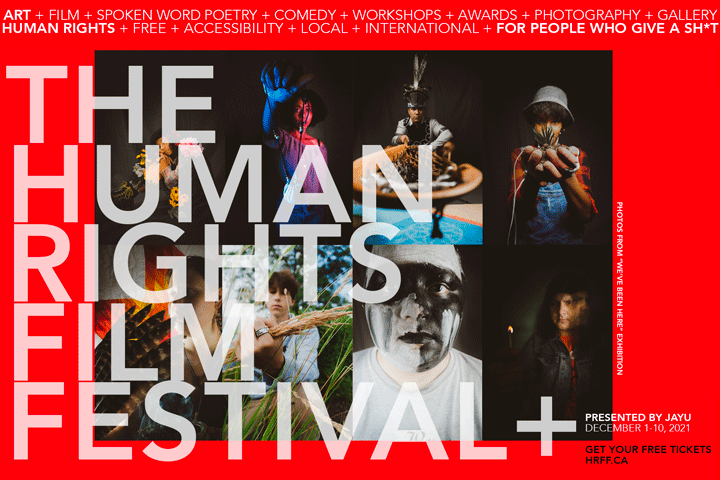
What would you say is your impact on the community?
With our Human Rights Film Festival, we’re most interested in how we change human behaviour. People who come into our cinemas might leave angry or inspired, but how do they challenge that energy into making change?
Each year, we connect with ground-level community partners who are working to solve some of the issues our films highlight. So if we’re screening a film about the wrongly incarcerated, our community partner might be an organization that helps wrongly convicted individuals. So as people are leaving the theatre, that organization is outside signing up people as volunteers. That’s behavioural change.
Our youth program has us work with over 200 equity-deserving youth every year, which means they may be racialized, live with a disability or a member of the LGBTQ2s+ community, and have historically faced barriers in a White supremacist, colonial world. We teach these youth how to use the arts to share their stories through our annual exhibitions and connect them to employment opportunities. So if one of our youth is graduating from a photography program, we have organizations like Luminato that may hire them as the official photographer of that event. So they’re learning to show up to work on time, photographing the event, meeting deadlines and learning how to invoice; it’s teaching a young person how to be an entrepreneur in the arts and inspiring leadership within themselves as well.
I find it interesting that you use the term “equity-deserving” versus the more typical “equity-seeking” youth. Is that a conscious decision, and what’s the difference for you?
Our organization made that shift last year. Equity-deserving is more of a statement. Specific communities deserve equity, but not every person considered ‘marginalized’ actually needs to ‘seek’ equity. They may already have it. However, everyone is deserving of equity, especially in some communities, more than others. It’s much more of an actionable term to us.
Is there anything else you would like to add before we wrap up?
If anyone is interested in donating to us, they can always make a tax-deductible donation at JAYU.ca/donate. Their contribution ensures that our programming continues to be free every year, which is part of our effort to eliminate barriers.
The 10th Annual Human Rights Film Festival will be running from December 1-10. Tickets are free, and you can see the schedule here.
